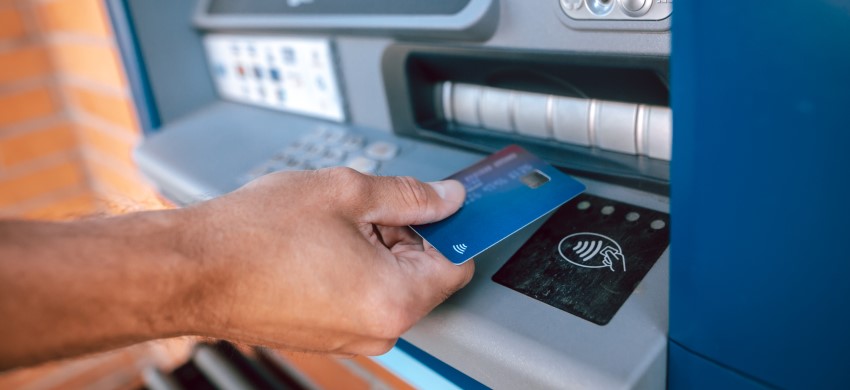We are seeing an increase in campaigns to protect access to cash given that last year alone UK cash machine withdrawals dropped by over a third. To stay relevant and competitive, banks must find innovative ways to guarantee ATM availability.
Our blog investigates ways this can be achieved.
1. Contactless ATMs
COVID-19 has accelerated digital transformation strategy across all industries, as well as interest in cardless cash withdrawals. RBR’s new report, Global ATM Market and Forecasts to 2025, reveals that the number of ATMs offering this solution is increasing as deployers around the world continue to embrace contactless technologies and adopt new alternatives.
ATM operators are finding ways to deliver cash and other vital services whilst mitigating risk.
In fact, cardholders can make cash withdrawals at the contactless ATMs without inserting a payment card. For example, ATMs can be equipped with NFC and QR code readers – RBR’s study reveals that the number of ATMs equipped with NFC readers increased by 83% already in 2019.
Other machines allow withdrawals via a one-time PIN or display anon-screen QR code, which customers scan using their mobile phones, whilst some also make use of biometric identification.
QR codes are seeing a revival, offering some practical solutions in this increasingly touchless and remote financial marketplace — including making bill payments easier, faster, and more secure.
Using specially equipped ATMs, the customer scans a QR code on the ATM screen using the bank’s scanning app. This not only caters to customers who don’t like the risk or hassle of carrying their ATM card, but also takes less time – eight seconds compared to 47 seconds per transaction, according to one bank using the technology.
2. Mobile integration comes to the fore
Cardless transactions go hand-in-hand with strong mobile integrations. Mobile payments provide a secure and convenient alternative to obtaining cash from contactless ATMs using an app. With the increase in fraud cases related to self-service devices, like skimming and jackpotting, mobile cash proves a much secure solution. As it does not require the user to insert their debit card or sensitive information into the ATM.
The benefit of mobile cash is if a customer forgets their debit card or just wants to travel with their smartphone, they can still access cash.
The mobile cash app works the same way as a debit card when withdrawing money, if the customer is using an ATM within their bank’s network, there should not be any additional fees charged. Plus, mobile cash provides more security as the code is for one-time use only, unlike debit cards that prompt you for the same code each time they are used.
Customers expect personalised and seamless experiences from their banks. To achieve this, banks can opt for highly secure and fully integrated solutions such as WWS Mobile, which offer customers the widest range of banking and payment services in the most cost-effective way – resulting in greater consumer satisfaction and new revenue opportunities.
It helps to tailor consumers’ ATM experience by considering how they can benefit from the mobile journey and how banks can use mobile phones to enhance the services they provide through all their delivery channels.
3. Biometric authentication
Biometric authentication can include voice and face recognition, where artificial intelligence and natural language machine learning are on the verge of transforming the fabric of voice-driven customer experience through pioneering speech recognition technology.
In Spain, Bankia enables remote contracting of financial products and services through the identification and registration of clients by video. This is thanks to Indra company, Minsait’s biometric technology for facial recognition, as well as the scanning and verification of official identification documentation.
This solution is part of NextGen Branches suite, which represents a comprehensive vision of the merging process of physical and digital channels through the creation of an ecosystem that covers all the phases of service.
Need to reinvent the ATM
Even after the current pandemic, we should expect to see the financial services industry continue to innovate in this area and develop new forms of ATM architecture. This is necessary for implementing new mobile cash technologies. Banks need to rethink their ATM infrastructure and invest in advanced software solutions to boost the profitability and functionality of the machines.
Only a Channel Integration Model would allow banks to easily implement a full ATM-mobile integration and, hence, embrace contactless technologies and adopt new solutions. It would also allow cardless ATM machines to behave like any other digital channel so that customers are able to access their bank at a time, and in a way, that suit them.
Having ATM software that enables seamless alignment with current and future needs is going to be key in the future. Customers demand consistency between mobile and physical channels – ATMs that meet those needs will lead to greater usage and could even reduce the cost per transaction of maintaining an ATM system.

 IT
IT  ES
ES 








